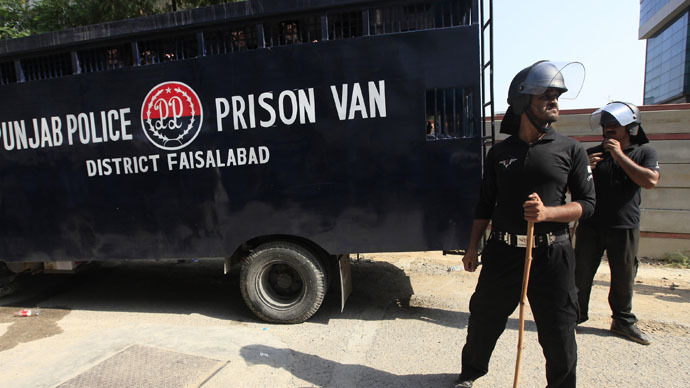Pakistan ends death penalty moratorium for all death row prisoners

Pakistan has lifted its moratorium on the death penalty in all capital cases. It will begin executing criminals whose appeals have been exhausted, a spokesman said, reversing an earlier decision that only those convicted of terrorism would be executed.
"It applies to all [on death row], irrespective of the nature
of the crime," said the spokesman, who told Reuters that the
order was made late Friday but not publicized.
"The Interior Ministry has directed the provincial home
departments to expedite the executions of all condemned prisoners
whose mercy petitions have been rejected by the president,"
a senior Interior Ministry official told AFP.
According to Amnesty International, there are currently over
8,000 people on death row in Pakistan. According to Legal aid
group Justice Project Pakistan, it's the largest number of
prisoners facing the death penalty in the world.
READ MORE: Pakistan amending constitution to set up anti-terror military courts
The country had a de facto moratorium on executions in place from 2008 until December, when Taliban gunmen killed 134 children and 19 adults at a school in the turbulent northwest. Since the worst militant attack in the country's history, Pakistan has hanged 24 convicts. Death penalty advocates say it's the only way to curb militancy in Pakistan, a nuclear-armed nation of 180 million people.
Following the deadly Peshawar school attack, Pakistan’s political
leaders amended the constitution to form an alternative military
court system that will try alleged terrorists and extremists. The
amendments would see military courts established for a specific
period of at least two years. Besides, the new legislative
roadmap would focus on curbing the spread of terrorism by
regulating seminaries, preventing hate speeches and provocative
literature, and preventing terrorists’ propaganda on the media.
Human rights groups argue that convictions are highly unreliable
in the country whose criminal justice system is notorious.
Justice Project Pakistan, which conducted research with Yale Law
School, documented nearly 2,000 cases of torture in the eastern
Pakistani district of Faisalabad. Interviewees accused police of
manufacturing evidence and torturing suspects. Meanwhile terror
cases are a challenge to prosecute, with extremists doing their
best to intimidate witnesses for lawyers to drop charges.
READ MORE: Pakistan revokes ban on death penalty after Taliban school siege
Many of those on death row were minors when they were arrested
and say they were tortured into confessing, Justice Project
Pakistan said, referring to the case of a man who was 14 years
old when he was sentenced to death ten years ago.
"We've seen time and time again that there is immeasurable
injustice in Pakistan's criminal justice system, with a rampant
culture of police torture, inadequate counsel and unfair
trials," the executive director of Justice Project Pakistan,
Sarah Belal, said in a statement.
"Despite knowing this, the government has irresponsibly
brought back capital punishment," she added.
Pakistan death row cells, often measuring 8ft x 12ft (2.4 x 3.6
meters) sometimes hold up to nine or more prisoners in each small
cell. Prisoners are confined to these small cells for up to 23
hours per day, Justice Project Pakistan reports.











